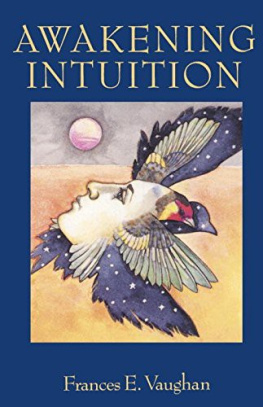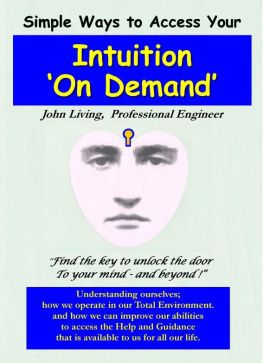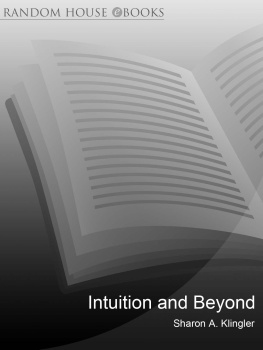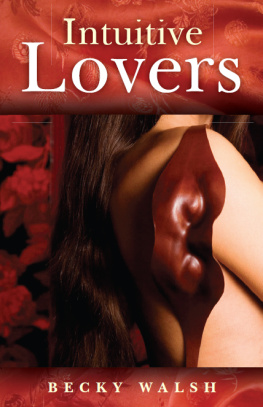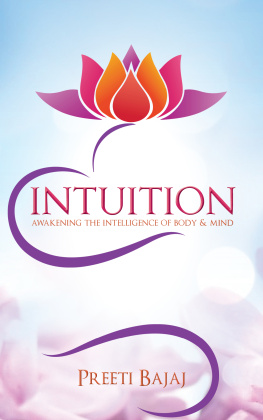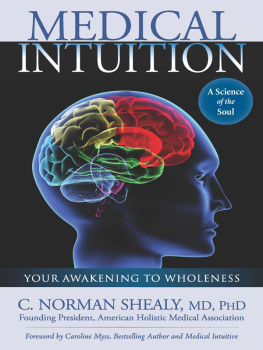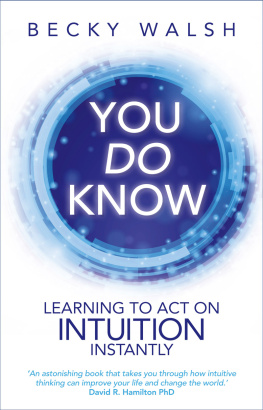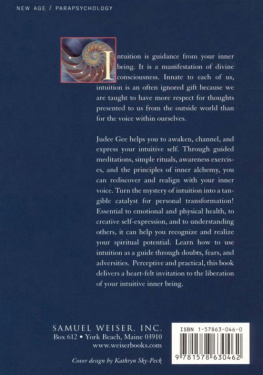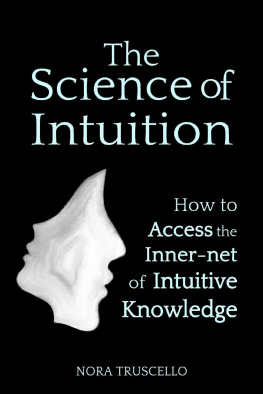Frances E. Vaughan - Awakening Intuition
Here you can read online Frances E. Vaughan - Awakening Intuition full text of the book (entire story) in english for free. Download pdf and epub, get meaning, cover and reviews about this ebook. year: 1979, publisher: Anchor, genre: Science / Business. Description of the work, (preface) as well as reviews are available. Best literature library LitArk.com created for fans of good reading and offers a wide selection of genres:
Romance novel
Science fiction
Adventure
Detective
Science
History
Home and family
Prose
Art
Politics
Computer
Non-fiction
Religion
Business
Children
Humor
Choose a favorite category and find really read worthwhile books. Enjoy immersion in the world of imagination, feel the emotions of the characters or learn something new for yourself, make an fascinating discovery.
- Book:Awakening Intuition
- Author:
- Publisher:Anchor
- Genre:
- Year:1979
- Rating:4 / 5
- Favourites:Add to favourites
- Your mark:
- 80
- 1
- 2
- 3
- 4
- 5
Awakening Intuition: summary, description and annotation
We offer to read an annotation, description, summary or preface (depends on what the author of the book "Awakening Intuition" wrote himself). If you haven't found the necessary information about the book — write in the comments, we will try to find it.
Awakening Intuition — read online for free the complete book (whole text) full work
Below is the text of the book, divided by pages. System saving the place of the last page read, allows you to conveniently read the book "Awakening Intuition" online for free, without having to search again every time where you left off. Put a bookmark, and you can go to the page where you finished reading at any time.
Font size:
Interval:
Bookmark:
AWAKENING
INTUITION
Frances E. Vaughan
ANCHOR ROOKS
Anchor Press/Doubleday
Garden City, New York
The Anchor Books edition is the first publication of AWAKENING INTUITION.
Anchor Books edition: 1979
Grateful acknowledgment is made for permission to reprint the following material:
Selected lines from "East Coker" from Four Quartets by T. S. Eliot. Copyright 1943 by T. S. Eliot and copyright 1971 by Esme Valerie Eliot. Reprinted by permission of Harcourt Brace Jovanovich, Inc.
Selected lines from "The Labyrinth" from Collected Poems by W. H. Auden. Copyright 1945 by W. II. Auden and renewed in 1973 by W. H. Auden. Reprinted by permission of Random House, Inc.
ISBN: 0-385-13371-5
Library of Congress Catalog Card Number 77-27685
COPYRIGHT 1979 BY FRANCES E. VAUGHAN
ALL RIGHTS RESERVED
PRINTED IN THE UNITED STATES OF AMERICA
Writing a book about intuition is truly paradoxical. Others, wiser than I, have rejected the impossible task of translating intuitive learning into the rational, linear language of words. But despite the fact that musicians, artists, poets, and others who use nonverbal forms of expression give more direct access to intuitive ways of knowing, many of us persistently feel the urge to communicate our experience, and attempt to use words to do so. Sharing the methods which helped me validate and expand my own intuition with hundreds of people in workshops and classes encouraged me to follow that urge, and this book is the result.
I had some difficulty writing in the third person. Originally I wrote as I would talk, shifting back and forth from first person, to second, to third. For the sake of consistency and readability, however, I have modified this, although I do not feel entirely comfortable with the impersonal style. I address you, the reader, as if you were in a workshop or seminar, and though at times this may sound didactic, it seems to be a way in which I can communicate clearly. Wherever I make statements about "one" I include myself; I felt "I" would be too restrictive, since I am attempting to discuss ideas that transcend the personal dimension of experience.
As you read this book, consider the exercises an invitation to explore for yourself some processes which others have found rewarding. You are ultimately responsible for what you do or do not choose to do, since I cannot know what is appropriate for you. You are free to pick and choose as you see fit, to accept or reject anything I say; you will recognize whatever is true for you. Awakening intuition is really about learning to trust yourself. My intention is simply to share with you some of the learning which has been meaningful to me in my life's journey.
In giving examples and recounting experiences shared by people in my workshops, I have changed the names of individuals and places in order to protect their privacy. I am grateful to all of you who have shared your intuitive experiences with me, both individually and in groups.
I am particularly indebted to Dr. Robert Gerard, who first introduced me to some of the exercises presented in this book, and who, five years ago, encouraged me to write a book about intuition. I also want to thank Jim Fadiman for his assistance in making this book a reality, and to acknowledge the many friends whose love and support have contributed to my work. I will not name you all, but you know who you are. And, for their special contribution to my life, this book is dedicated to my children, Robert and Leslie.
PREFACEv
INTRODUCTION1
Tuning In to Intuition
Choosing Your Own Way
Varieties of Intuitive Experience
Imagery and Intuition
Dreams and Intuition
Practical Problem Solving
The Wisdom of Intuition
APPENDIX Guidelines for Awakening Intuition
REFERENCES207
In order to arrive at what you do not know
You must go by a way which is the way of igno rance.
In order to possess what you do not possess
You must go by the way of dispossession.
In order to arrive at what you are not
You must go through the way in which you are not.
And what you do not know is the only thing you know
And what you own is what you do not own
And where you are is where you are not.
T. S. ELIOT: Four Quartets
Intuition is known to everyone by experience, yet fre quently remains repres sed or undeveloped. As a psycho logical function, like sensation, feeling, and thinking, intuition is a way of knowing. When we know something intuitively, it invariably has the ring of truth; yet often we do not know how we know what we know.
Popular interest in the development of mental powers has prompted many people to pay more attention to their latent intuitive abilities. Although everyone has intuition, it is more highly developed and more available to some people than others. It is, however, possible for everyone to awaken his or her own intuition and to use it both helpfully and profitably in everyday life. Learning to use intuition is learning to be your own teacher, and getting in touch with your own inner guru.
The role of intuition in creativity, problem solving, and interpersonal relationships is vital, yet it is frequently discounted and mistrusted by those who do not understand it. Many people are frightened by experiences which seem unusual, illogical, or paranormal, and therefore fail to make use of their intuition as a source of creative inspiration and reliable information about themselves and their environment. Almost everyone, however, by becoming more aware of how intuition works, and by giving careful consideration to the problems of its validation and interpretation, can make much fuller use of intuitive capacities.
Extrasensory perception, clairvoyance, and telepathy are part of the intuitive function. Likewise, artistic inspiration and mystical religious experience are intuitive perceptions of reality. Current brain research indicates that the left hemisphere of the brain is predominantly rational, linear, and verbal in its functioning, whereas the right hemi. sphere is predominantly intuitive, holistic, and oriented toward pattern perception. In recent years new methods have been developed for educating and training the neglected intuitive faculties.
In addition to opening one to the aforementioned experiences, developing the intuitive faculties allows one to recognize the possibilities inherent in any situation. When one becomes aware of possibilities, one is free to make choices. Choice is always available, but it becomes real only when one is conscious of having it; if choices in life are made automatically, or unconsciously, the experience of freedom remains elusive. Awakening intuition enables one to see the choices available and is thus a liberating experience. Before experiencing this liberation, however, one must first make a fundamental choice with respect to intuition itselfwhether or not to give time and attention to its awakening.
This book presents a number of exercises designed to bring about a well-balanced integration of the rational and intuitive functions. They may or may not be of use to you; only you can judge. Consider the exercises an invitation to expand your experience by developing a greater awareness of what you already know. There is nothing you have to do to awaken your intuition; but if you choose to do the exercises they will work most effectively if critical judgment is temporarily suspended in order to allow intuition to emerge. Ho l ding it in abeyance should not be confused with turning it off, however, as your rational, discriminating judgment is essential to checking the validity of intuitive perceptions and evaluating the process.
Font size:
Interval:
Bookmark:
Similar books «Awakening Intuition»
Look at similar books to Awakening Intuition. We have selected literature similar in name and meaning in the hope of providing readers with more options to find new, interesting, not yet read works.
Discussion, reviews of the book Awakening Intuition and just readers' own opinions. Leave your comments, write what you think about the work, its meaning or the main characters. Specify what exactly you liked and what you didn't like, and why you think so.

